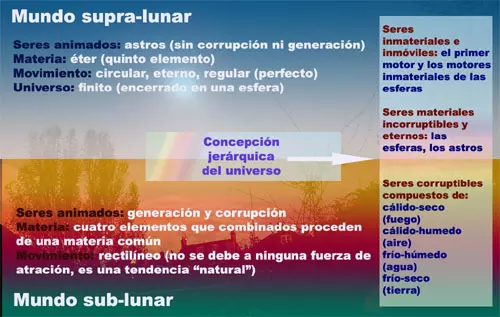Since knowing something scientifically is knowing its causes, physics must worry about establishing the causes of natural beings.
The root cause or principle of each thing is its own nature and therefore it is necessary to stick to it.
It therefore establishes four cases:
The material cause (e.g. bronze statue)
The formal cause (e.g. the shape of the statue)
The motive or efficient cause (e.g. the sculptor)
The final cause (Ex: adorning a temple)
Aristotle thinks, in short, most of the time, as a biologist and therefore affirms that the end and the motor are reduced to form: it is she who moves the living being from within, as nature and its improvement, as enteléchia, is the purpose of life. Thus appears the formal priority that characterizes Aristotelian metaphysics.
Physics deals with the nature and causes of “natural” beings. Now, it is clear that all natural beings are in motion, a fact that Aristotle admits from experience.
Aristotle distinguishes different kinds of exchange (metabolé):
Generation (Genesis)
Corruption (of substance)
Movement (kinesis)
& #9658;Quantitative: Growth and Decline
& #9658;Qualitative: Alteration
& #9658; Location: Translation
Aristotle further points out that all philosophers have tried to explain nature from a system of opposites. Empédocles spoke of “love” and “hate”, Democritus of “full” and “empty”, Pythagoras of “even” and “odd” and so on... but while this path would be correct in principle, it is finally insufficient to explain the change, because a term cannot be transformed into its opposite because in this way more than transform would be destroyed. Aristotle then argues that it is necessary to resort to a third principle: the subject of opposites because movement can only be explained through three principles:
& #9658; The Subject (hipokimenon)
& #9658; The form
& #9658; Deprivation of form
In every change remains the subject (who is the one who changes and transforms), which passes from deprivation to possession of form. Aristotle will say by way of example that this is how man becomes “cult”, moving from in-culture to culture.
The three principles are translated in terms of material-form: the subject (matter), the deprivation of form and form. In terms of acto-power: the subject in power, the power and the act.
Movement is the act of what is in potential as it is in power. Aristotle recognizes that it is not easy to understand the essence of the movement because it is neither act nor power but a kind of “incomplete act”: it is the updating of what is in powers, while still in power. When this power is fully updated, then the movement ceases, and if the subject is in pure power, it is not yet in motion.
The movement is then an intermediate reality.
At the end of Physics Aristotle affirms the existence of eternity of movement and time. The chain of generations has no beginning and goes back to infinity. Nor will it end because movement and time never end. He then states that a first motor is necessary to cause the eternal motion of the cosmos. Since movement is the passage of power to the act, there must be a motor (kinetikón) that makes the mobile from the pence to the act, thanks to the fact that he already possesses in fact what the mobile only possesses in power.
“Everything that moves is moved by another” but if the engine moves while it is in turn moved, both movements are simultaneous. You can multiply to infinity the number of engines moved simultaneously, but in this case, the series does not have to be infinite, but there must be a first motor that, being motionless, causes the movement of the world: thus, the movement of the world is eternal but possesses a first motor. The first engine moves the world from all eternity
The cosmology of Aristótles, which partially follows Plato, will be the paradigm of medieval science, until the scientific revolution of modernity.
Essential Features
Everything is explained by the immanent “nature” or “qualities” of physical bodies.
The purpose is the key concept for explanation. The immobile engine is the ultimate cause.
The platonic dualism of the world of Ideas is replaced and the world of Things is replaced by the supralunar world and the sublunar world.
The claims are merely deductive and speculative. There is no empirical basis.
